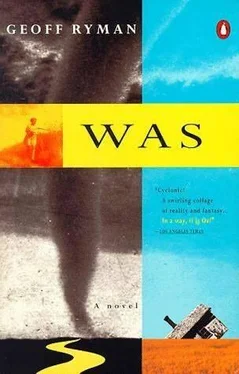"Well, it must be feeling good because it's just had a nice cool swim," said Frances's mother. She smiled at her child and then walked on, toward the kitchen,
"A wet little frog," said Jinny, and began to thump a bit harder on the piano.
Nobody can be louder than me, thought Frances.
"Gerump!" she shouted, hopping. "Gerump! Gerump!"
"Frances," said Jinny, a warning rising in her voice, "I'm trying to practice."
"Let's see how high the frog can jump," her daddy said. He bent over and picked her up.
"Bounce," he said and let her feet touch the ground and swooped her up again. "Bouncy… bouncy… bouncy!"
Each bounce was higher. Frances was bounced across the hallway, out of the living room and into the dining room. Her father picked her up, as high as he could, all the way up to the ceiling.
"It's a flying frog!" he exclaimed.
"Don't!" giggled Frances. "No."
Janie came in, carrying plates. She looked tired, circles under her eyes, tired and unhappy, and she took no notice of either of them.
"I'm flying, Janie!" called Frances. Janie turned and gave her a flicker of a worn, dim smile and then went back into the kitchen.
Grandmother Milne came out, carrying a vegetable dish. "Don't make the child giddy before dinner," Grandma said.
Frances was lowered to the floor. Sssssh, Daddy went with his finger on his lips to show they should both be quiet.
Ssssssh, went Frances back.
"Are you going to show me your ballet steps?" he whispered.
Frances nodded yes. She pushed her daddy back toward the wall, to get him out of the way. Then she held her arms out straight and ran, not quite on tiptoe but very quickly, scuttling across the dining room floor.
"Very good," said her father.
Sssssssh, said Frances, finger on lips.
He pretended to go "Ooops!" and covered his mouth with his hand.
Sssssh, Frances reminded him again.
Sssssh, he said back. She did her ballet steps, running back across the room again.
The kitchen door swung open. "Supper's on the table," said Grandmother Milne. Frances could only see her long brown skirt, under the table.
"Daddy, be quiet," said Frances, now that it was all right to talk again. She marched to her chair and climbed up onto it, hoisting a leg across it, and then rolling over. She did not sit on the chair but, rather, knelt. The table was at her chest height, and the knife and fork were huge, but Frances was proud of her ability to eat with them by herself. She made a point of being very adult at the table. Jinny came in carrying a pitcher of water, then Janie, Grandma, and Mama next to her. Daddy sat at the end of the table away from Mama, away from everybody, it seemed.
"All right, Frances," said her mother.
"For what we are about to receive," said Frances, eyes closed with devotion, "may the good Lord make us truly thankful. Amen."
The food was served mostly in silence. Grandma Milne spoke twice. "Frank. This is yours," she said, holding out a plate of chicken and mashed potatoes, stretching toward him. She looked only at his hand as he took it, to make sure none of the food was spilled. "Virginia," she asked, "are you hungry?"
"No, Grandma," said Virginia.
"It's the heat," said her mother. "Jinny, you must try to eat something." She nodded to Grandmother, and a heaping plateful was served. Frances was next. She ate well. She always ate well. Chicken and gravy and mashed potatoes.
"Don't stir it so, Frances," said her mother.
Frances had forgotten how to eat mashed potatoes. She knew you were supposed to pile them on your fork, somehow, but they kept slipping off.
"Frances, you're making a mess," said her mother, and reached forward to help her eat.
"Uuuuhhhh!" said Frances in protest. She tried again. The fork was too big to get into her mouth.
"Take less, Baby, just with the tip of the fork."
Frances scowled and thought about what that could mean. It's like dancing, she told herself. You step with your hands. Tap is done with the toes. So I eat tippy-toe.
Delicately she picked up a fluffy piece of potato on the end of the prongs and twisted the fork around, so that just the tip could go into her mouth.
"That's better. Good girl. See?" Her mother was pleased.
Frances knew they all depended on her. She knew that without her, none of them would talk to each other. They only talked when there was company, or a show, or when Baby Frances did something to make them all laugh. It all came down to her.
Supper was cleared up in a hurry. Mother went up first to bathe and change. Jinny went to help Grandma wash up. Janie and Daddy played with Frances.
They played a game of catch with Loopy. Loopy was a hand puppet, and there was a certain thrill of cruelty in throwing him about the room. Whenever Janie caught him, she put him on and pretended to make him hide behind Daddy's back.
"I've got something to hide," she would say in a funny voice and make Loopy peek out from behind Daddy's back. Frances would laugh, and try to catch Loopy in a lunge and always miss. Loopy would duck away.
"I'm doing something you can't see!" said Loopy.
Her father stepped away, his grin too wide. Frances ran forward, hands outstretched to try to get Loopy, and Janie threw him, high over her head, to Daddy.
"Daddy's got the secret now," Janie said.
"No, I don't," he said, his queasy smile suddenly unsteady. He flung Loopy away too quickly, as if the puppet could burn him, too quickly and too high. Loopy careered into the mantelpiece. A tiny dish was knocked off it.
"Uh-oh," said Janie, in alarm, and looked at Daddy.
"Oops," said Daddy, and they both laughed. Frances decided to laugh too, even louder than they did.
"Quiet," said Janie, her mouth stretched downward from tension. Both she and Daddy knelt down and began to pick things off the carpet.
Loopy was forgotten. "What are you doing?" Frances asked, walking toward them.
"We've knocked over your mother's seeds," said Daddy. "She's going to plant them in the spring."
"They're from home," said Janie. Home was still Grand Rapids.
Frances knelt down too, and all of them pecked at the seeds with their fingers, like birds' beaks.
"Looks like these are going to grow a healthy crop of throw rugs," said Daddy, holding one up, covered in fluff.
"Fran-ces!" called her mother from upstairs. "Come on up, honey, and I'll do your makeup."
"Show time," murmured Frances, and rolled her eyes. Sometimes she found the whole thing bored her.
There were always two movies shown at the Valley Theater. The songs came between the movies. Tonight the first feature was a Western. As she watched, Frances played the parts along with the actors. Her face mirrored the shapes the actresses made with their mouths, the wide O's, and their wide eyes and their fanned-out fingers held up in surprise. Frances thought they weren't putting enough into it. She would make a great deal more fuss. She would run around and help the hero more.
She wondered if silent actors bothered to talk when they were being filmed. She wondered if they stayed as silent as the movies.
Suppose everything was silent. Suppose you wanted to scream, but couldn't make any sound. You couldn't make anybody notice you. You could wave your hands, but people might not see. It would be like you were drowning.
Suppose no one knew they were in a silent movie? They would all think they were talking. They would move their mouths and nod their heads, but no one would say anything.
Frances watched her mother play piano to make some sound for the movie. Her mother was reading a book at the same time. Her mother was always doing two things at once. Like living in Lancaster and driving to Los Angeles all the time.
Frances was scowling in the dark. Whenever there were guests, Frances could feel the whole family launch itself forward together, forward like it was a show. Mama took Papa's arm, which she never did otherwise. Papa smoked cigars and swaggered, talking to the men, and Mama would laugh with the ladies. Then they played cards. Their voices would be smooth, modulated, flowing.
Читать дальше












